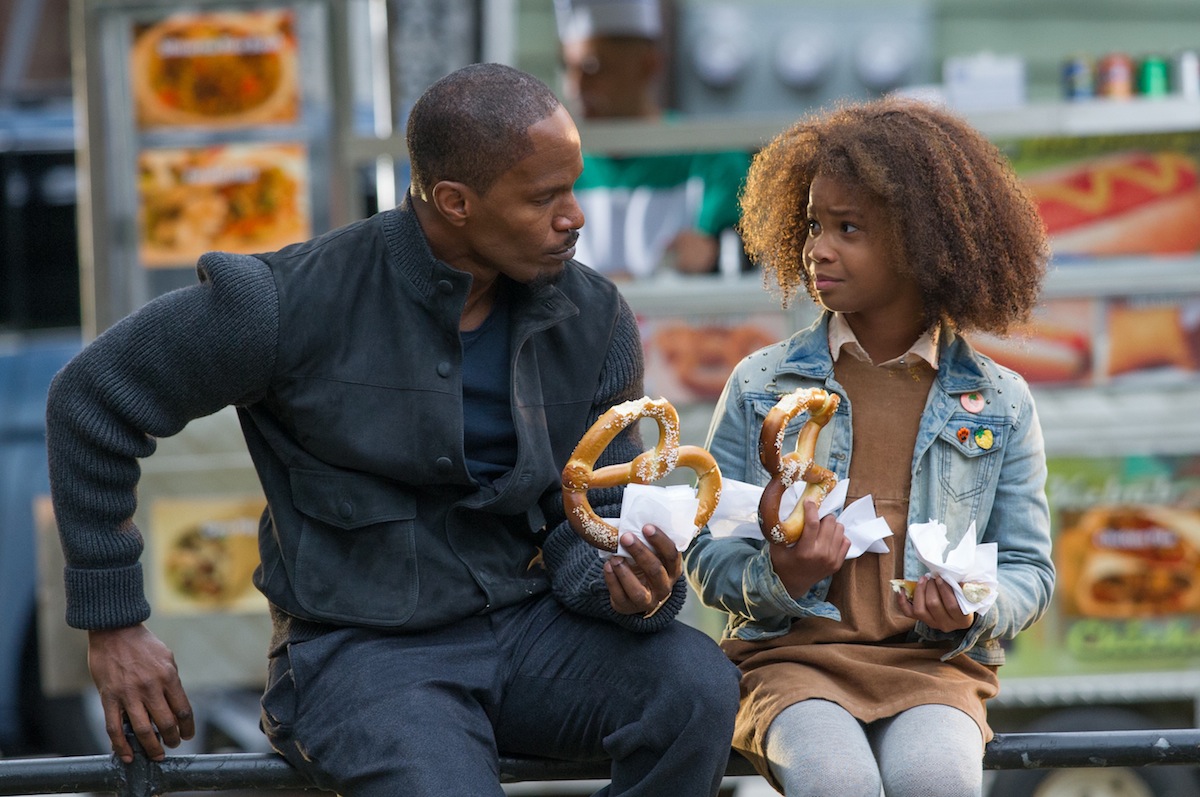
The new version of Annie — in theaters Friday — doesn’t exactly shy away from its New Deal origins. Mere minutes of the film have passed before the newest actress to step into the orphan’s shoes, Quvenzhané Wallis, is talking about Franklin Roosevelt and the Great Depression.
Except this time that history is, well, history. The musical that once contained songs with the actual titles “We’d Like to Thank You Herbert Hoover” and “A New Deal for Christmas” has been updated for modern times. And, though its Daddy Warbucks equivalent (Jamie Foxx as Benjamin Stacks, a New York gazillionaire with aspirations à la Michael Bloomberg) is still involved in politics, the story has left behind much of its erstwhile focus on the national political climate.
“The interesting thing about Annie is that it was started as a political cartoon and with pretty biting social and political commentary, and then it was turned into a musical, and people have forgotten that,” says Will Gluck, the writer-director behind the new adaptation. “They just think about ‘Tomorrow,’ the plucky kid and the dog.”
The content of that original social commentary may surprise some of today’s “Tomorrow” singers. In the ’20s, when the strip debuted, Little Orphan Annie was already “issuing a steady stream of far-right propaganda.” In 1935, one newspaper canceled the comic because “Annie has been made the vehicle for a studied, veiled, and alarmingly vindictive propaganda.” Cartoonist Harold Gray was a staunch believer in the way Daddy Warbucks got rich, which was “doing his job and not asking for help from anyone,” as he put it. “Gray agrees that Annie dabbles in dialectics, and he has no intention, of stopping her,” TIME commented in 1962. “To Artist Gray, Daddy and Annie are salesmen of the American dream, the “pioneer spirit” that without assistance, even from the State Department, can cope with Castro, neutralize the H-bomb, and eliminate the income tax.”
In the 1970s, however, when Annie went to Broadway, though TIME opined that her newspaper-comic twin was “still fight[ing] the Red Menace and bleeding-heart liberals,” the character’s priorities changed. In the musical version of Annie, the spunky orphan — who has already helped her war-profiteering rescuer realize that those who have less are worth taking care of — is brought along to a meeting with FDR, at which point her natural optimism helps inspire the President to institute the New Deal. The general take-away, besides the fact that the sun will come out tomorrow, is that New-Deal-style, progressive policies help everyone get the fair shake he or she deserves. Annie’s can-do pluck is still important, but she’s optimistic about the government’s ability to help all rather than individuals helping themselves.
Gluck says that, while updating the story for today’s audiences — Annie lives in a foster home rather than an orphanage, for example — he didn’t want to lose that part of the story’s background. “The one thing I wanted to keep is the socioeconomic divide of the Depression,” he says, “which sadly has even gotten bigger now and sadly is not going away.” That was why he made sure to have his Annie teach viewers a little lesson about the Great Depression when, she says, things were just like they are today except without the Internet.
Still, this iteration of Annie ends up bringing the political girl to a more centrist position.
By keeping things local and staying away from specific historical moments — no, new Annie does not inspire the President to believe that there really are plenty of shovel-ready stimulus projects out there — some of the specificity of Annie’s political message is lost too. Stacks thinks that in New York City, if you work hard enough, you can achieve anything you want, just like old-fashioned Daddy Warbucks did. Meanwhile, Annie recognizes that folks in her neighborhood are often ignored and left behind, even when they work hard, just like her theatrical predecessor did. They each come to see the other’s side a little better, but the audience doesn’t come away singing a song about Obamacare.
But, Gluck says, that’s a better fit for the audience anyway — though not because today’s political divides are so treacherous. Adults may see Annie as a rags-to-riches story, he says, but kids don’t really know what that means; the core message of Annie, about hope and optimism, works just as well now as it did in the ’70s or ’30s because it’s a universal story. “I don’t believe the end of the movie is that she got to live with a rich guy,” he says. “I believe that to her the end of the movie is that she got to find a family.”
Besides, he still remembers the first time he saw the original Annie, and the questions he had for his parents when it was over: Who is Herbert Hoover and who is that guy in the wheelchair? When he took his own kids to see Annie on Broadway recently, they had the same exact questions. His movie’s young viewers, however, won’t be left scratching their heads. “You don’t need to study for this essay question,” he says.
Read our original review of the musical Annie, here in the TIME Vault: No Waif Need Apply
More Must-Reads from TIME
- Donald Trump Is TIME's 2024 Person of the Year
- Why We Chose Trump as Person of the Year
- Is Intermittent Fasting Good or Bad for You?
- The 100 Must-Read Books of 2024
- The 20 Best Christmas TV Episodes
- Column: If Optimism Feels Ridiculous Now, Try Hope
- The Future of Climate Action Is Trade Policy
- Merle Bombardieri Is Helping People Make the Baby Decision
Write to Lily Rothman at lily.rothman@time.com